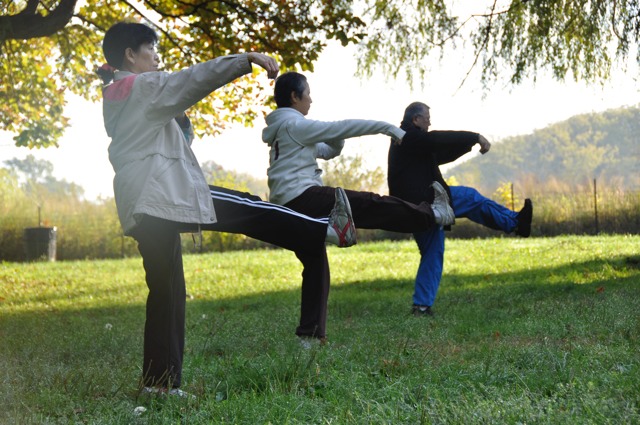
One recent morning, I went to Kissena Park with my dad and my little sister to explore the tai chi scene. We met up with Teacher Du and two of his students, both middle-aged women with sweet, open demeanors. (They treat him with deep respect and perform tai chi under his guidance, but there’s no payment for instruction.) Several routines were practiced, one that Teacher Du himself had choreographed. But, in retrospect, it’s the incidental moments, the little things that happened off to the side, that seem central to the intimate serenity of that morning.
Gathering pu gong ying
When we arrived, the trio were crouched in the grass, gathering leaves from the ground, their manner lightly absorbed, unhurried. They were gathering, I was told, pu gong ying—which, if Google serves, translates as dandelion leaves—into plastic bags. They were careful to snap them off by the stems, rather than pulling them up by the roots, so that the leaves would soon grow back. According to Teacher Du, the leaves aren’t meant to be eaten; one of the women, Auntie Huang, would brew them briefly and drink the liquid. Auntie Huang has short, slightly graying hair and a beautifully smooth, gentle face. In traditional Chinese medicine, pu gong ying is said to treat such various conditions as cancer, diabetes, and heartburn.
It was only later, when Teacher Du made a reference to Auntie Huang’s hair having grown back nicely, that I learned she has just undergone extensive treatment for breast cancer.
A Depressed Turtle Named Turtle
When the pu gong ying had been gathered, Auntie Huang reached into her bag and plucked out a turtle. She’d brought him out to get some sun. When Teacher Du asked if the turtle had a name, she said, “You can call him Turtle.” (In Chinese, the pronoun is gender-neutral; I’m assigning the maleness.) Every now and then, between routines, Auntie Huang would check on Turtle. He never seemed to have moved, but the sunlight did, through the willow trees, so she’d pick him up from his newly shady spot and set him down again in a patch of sun. I mentioned that he must be happy. Actually, she said, she thinks he’s depressed; he hasn’t been eating, drinking, or moving. Indeed, even when a big, unleashed dog bounded nearby, Turtle stayed still.
Feeding Swans
The reason the group was practicing in Kissena Park that week, rather than in the Queens Botanical Gardens, where they’d first met one another nearly ten years ago, was that “the swans are back.” When practice was over and my father, my sister, and I took our leave, Teacher Du insisted on giving us a bag of bread crusts. As soon as we stepped to the edge of the pond, two large swans swam up, snorting, along with a few deferential ducks. It occurred to me that you’re not supposed to feed wildlife, but the moment was hard to resist.
Teacher Du had told us the swans would feed right out of our hands, but I thought they had mean faces. (The animals that have bitten me include a horse, a dog, and a duck.) I tossed a few scraps of bread (once, accidentally hitting a swan in the neck) and let my dad hand out the rest. The birds gulped the pieces of bread that were tossed close to their beaks, though they didn’t expend much energy in swimming after the scraps. They seemed well-fed—probably by Teacher Du.
The three of us, on the other hand, were starving. We emptied the bag, then headed off to Fay Da Bakery to pick up curry pastries and pineapple buns for our own breakfast.
Originally published at Open City: Blogging for Urban Change
